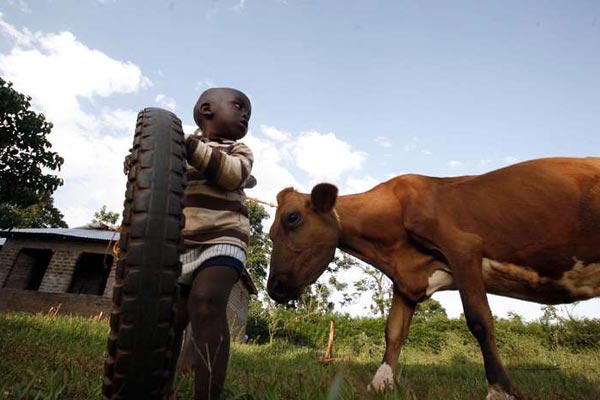Hygiene in the farm starts with clean surroundings because some waste material can disturb animal comfort and health.
Many a times, we focus of clearing animal waste, feed remains, any unwanted vegetation or soiled pieces of paper within the vicinity of the animals but forget the disastrous plastic bags. Ingestion of plastic bags can kill animals.
Pieces of plastic bags may find their way into the farm through hay bale wraps, package material from mineral supplements, package from commercial animal feeds, materials carried by wind and frequently the use of polythene pieces in tightening Jerican containers like those of molasses.
The effects of plastic ingestion extend beyond the animals to include consumers of milk or meat. Most farmers suspecting that an animal has ingested plastic bags will many times slaughter them secretly and this because they are aware of the harmful effects on people consuming the product.
The plastics have polymers that are carcinogenic, thus induce cancer and tuberculosis in humans who consume products from the affected animals.
To some extent, the toxins in the plastics remain in human breast milk and expose suckling babies to health dangers.
WHY ANIMALS EAT PLASTICS
Just like children can eat dirty stuff, animals can eat different materials that may have no known nutritional value but just for curiosity. Plastic materials have varying tastes; some are sweet while others taste salty.
Another scenario is where animals are confined, like in the zero grazing units. In this case, if not well supplemented with minerals, animals become mineral starved thus start hunting or get attracted to tasty materials or licking someone near them, grind wooden posts that are not dry within their enclosures. Such animals will swallow plastic polythene bags that hang around.
Some animals are also tethered along the roads while others are left to graze openly. During this time of grazing, they get exposed to these dangerous plastic materials or at times are forced to scavenge for food in garbage areas.
They should be well supplemented with minerals, and if they must be tethered, then tether them away from garbage materials with pieces of polythene bags.
SIGNS THAT AN ANIMAL MAY HAVE INGESTED PLASTIC BAGS
Ingestion of plastic materials may not result in immediate death, but there are several difficult symptoms seen in the victim animals.
These plastics are indigestible and therefore pile up in their stomachs (rumen for cattle) with time and get entangled with different materials, forming a hard cement-like ball.
After some time, the animal shows signs of being weak and tired then goes off feed and at times experiences bloat due to stomach blockage. The animal may also start drinking a lot of water.
What follows high amount of water intake may be diarrhoea because of blockage except in liquids. This animal’s condition gets poorer every day to an extent of showing extreme discomfort, and if no action is taken, the animal dies.
TREATMENT
There is no vaccination that will help keep your animal safe from ingesting plastic bags. Your animal will also not pass large plastic material through the waste.
Some are lucky though, to pass them out when consumed in smaller pieces. There are no drugs for destroying plastic bags while in the animals’ stomach.
Luckily, some people have successfully used laxatives like high quantities of mineral oils, given to the animal to help breakdown solid materials and smoothen plastic to increase chances of slippery passage. This on the other hand, could complicate diarrhoea.
As such, a sure way to try and save the animal from death is surgery to remove the plastics plus other waste items from the stomach by the help of a veterinary surgeon.
Surgery, again, will cost you much money, just imagine doctors’ fees and the loss of the animal whether most valued in the farm or not. It can be this painful, just because of the plastic bags we ignore around the animal.
As prevention is better than cure, keep the animal surrounding free of plastics, be selective on where to tether your animals to forage and ensure mineral supplements are availed to the animals.








